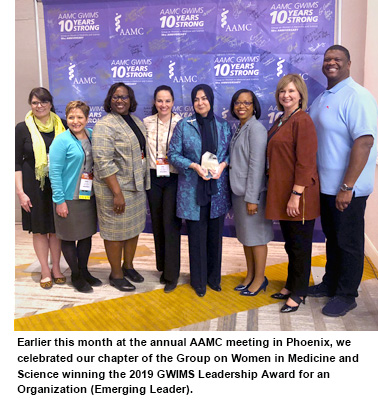Affirming Our Path
Good morning!
Last weekend I had the opportunity to attend the annual meeting of the Association of American Medical Colleges, this year in Phoenix, Arizona. I always enjoy this meeting because I learn a lot from colleagues at our peer institutions and there’s always an impressive lineup of speakers from both inside and outside the organization.
 The keynote speaker this year was Bryan Stevenson, a civil rights lawyer based in Montgomery, Alabama. Stevenson leads the Equal Justice Initiative, which works to reverse the convictions of prisoners wrongly sentenced to death. He is the author of the best-selling book, Just Mercy: A Story of Justice and Redemption.
The keynote speaker this year was Bryan Stevenson, a civil rights lawyer based in Montgomery, Alabama. Stevenson leads the Equal Justice Initiative, which works to reverse the convictions of prisoners wrongly sentenced to death. He is the author of the best-selling book, Just Mercy: A Story of Justice and Redemption.
Stevenson recited statistics of incarceration in America today, where 2.2 million citizens are serving in prison and minorities are vastly overrepresented. A statistic that he said keeps him up at night: One in three African-American males born in this country will go to prison during his lifetime.
“There’s an epidemic of hopelessness in so many of the communities where there’s poverty and despair,” he said in an AAMC news release about his talk.
He believes academic medical centers have a role to play in addressing these ills and helping to create a healthier community. One necessary ingredient is “proximity,” which often requires us to get out of our comfort zones and meet people where they are.
“We need to get close enough to wrap our arms around (those who suffer) and affirm their humanity,” he said.
His speech, which many attendees described as the most inspiring they’d ever heard, struck a number of chords with me. I am proud that we are national leaders in adopting population health approaches – taking into consideration the social determinants of health – in our medical practices and in our academic programs.
The current leaders of the AAMC – Dr. David Skorton and Dr. Lily Marks – discussed some of the major challenges facing academic medical centers.
Dr. Skorton, a cardiologist who became president of the AAMC last summer after a stint leading the Smithsonian Institution, said academic medical centers do many things exceptionally well – training health care providers, discovering cures and delivering superb care. But “the system still fails for so many,” he said, including students overburdened with debt, patients who can’t afford their care and faculty frustrated by the loss of autonomy and the intricacies of electronic health records.
He also urged the audience to do more to confront the epidemic of mental illness and substance use disorders; to address the ever-increasing cost of health care; and to promote diversity, equity and inclusion in medicine.
Again, even though these are all daunting challenges, I feel that UMMC is on the right path – and in many cases is a leader – in confronting them. For example, we pioneered a medical student-led initiative to increase enrollment of African-American males in medical schools. And yesterday’s eCV carried an interesting follow-up story on our Health Equity and Leadership Initiative involving four young African-American men.
Dr. Lily Marks, vice president for health affairs at the University of Colorado Anschutz Medical Campus and chair of the AAMC Board of Directors, expressed concerns that a number of forces in our society have converged “to challenge and potentially erode” academic medical centers’ core missions.
In particular, she cited continued cuts in state and institutional support for health sciences education, cuts that can no longer be absorbed by increasing student tuition or diverting dollars from the clinical enterprise.
Certainly, we struggle with these issues. We often hear the term “no margin, no mission,” suggesting that we cannot be successful unless our clinical programs generate a financial return. However, Marks warned, “the margin cannot be the mission.”
“Virtually all our institutions now face the enormous challenge of funding and delivering these public goods in an era when society is questioning the value of higher education, the veracity of science, and the cost and value of the health care services we provide,” Marks said.
One of the highlights of the meeting was the recognition of the UMMC chapter of GWIMS – the Group on Women in Medicine and Science. Our chapter, which was formed only six years ago and has grown to include 700 members, won the award as an “emerging leader” among all GWIMS chapters. I’m so proud of this group and the work its members are doing.
A personal highlight of the meeting was the recognition of Dr. Paul Roth, chancellor for health sciences and dean of the University of New Mexico School of Medicine, who has announced his retirement after an astounding 26 years as dean. (The average tenure is closer to 5 years.) When I was named vice chancellor for health affairs and dean of the School of Medicine four and a half years ago, Dr. Roth was assigned to be my mentor. I couldn’t have asked for a better one, in part because, somewhat surprisingly, UNM and UMMC have so much in common; but also because he is such a thoughtful and caring person who wears the mantle of leadership with humility and grace. Thank you for everything, Paul.
These annual meetings are always uplifting, exhilarating and challenging. This year’s was also affirming. Despite the many challenges we have, I learned that we are on the right path – and in some cases at the forefront – which is leading us toward A Healthier Mississippi.



